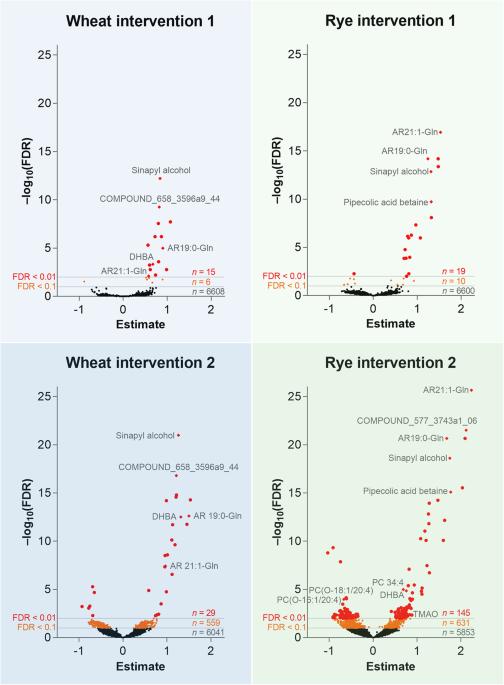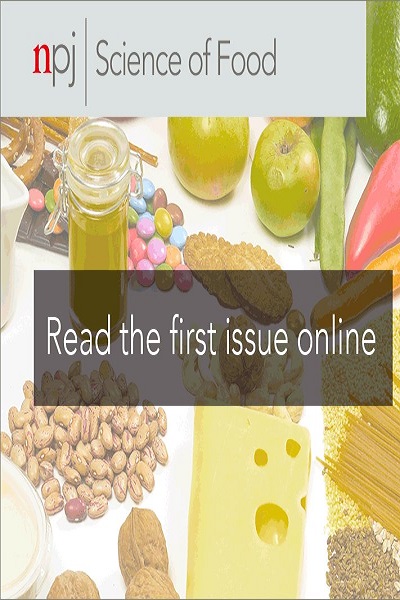不同全麦和黑麦摄入量引起的代谢变化。
IF 7.8
1区 农林科学
Q1 FOOD SCIENCE & TECHNOLOGY
引用次数: 0
摘要
流行病学研究表明,摄入全谷物与降低疾病风险之间存在关联。目前尚未确定摄入足够量的全谷物才能对健康有益,而有关全谷物摄入对代谢物水平影响的知识也很有限。在这项临床干预研究中,我们旨在确定与全谷物小麦和黑麦两种不同摄入量相关的血浆和尿液代谢物,并将它们与临床血浆生物标志物联系起来。健康志愿者(68 人)被分为两组,分别接受全谷物小麦或全谷物黑麦,干预为期四周,全谷物摄入量分别为 48 克/天和 96 克/天。采用 UPLC-QTOF-MS 对血浆样本进行了代谢组学分析。血浆中的烷基间苯二酚采用气相色谱-质谱法进行定量,血浆和尿液中的哺乳动物木质素采用 HPLC-ECD 法进行定量。与小麦相比,高剂量干预对富含黑麦的膳食中代谢物(包括微生物代谢物)的影响更大。增加的代谢物包括烷基间苯二酚葡萄糖醛酸、山奈醇和哌啶醇甜菜碱,而减少的代谢物包括酰基肉碱和醚脂。血浆中的烷基间苯二酚、尿液中的肠内酯和哺乳动物木脂素总量反映了研究膳食的剂量依赖性。与全谷物消费和肠道微生物代谢相关的几种关键代谢物在两种干预措施之间呈线性增长。研究结果表明,全谷物(尤其是黑麦)摄入量的增加在代谢物谱中反映强烈,与临床变量相关,并表明富含全谷物的膳食能促进微生物的生长和/或代谢,产生潜在的有益微生物代谢物。本文章由计算机程序翻译,如有差异,请以英文原文为准。

Metabolic changes in response to varying whole-grain wheat and rye intake
Epidemiological studies have shown associations between whole-grain intake and lowered disease risk. A sufficient level of whole-grain intake to reach the health benefits has not been established, and there is limited knowledge about the impact of whole-grain intake on metabolite levels. In this clinical intervention study, we aimed to identify plasma and urine metabolites associated with two different intake levels of whole-grain wheat and rye and to correlate them with clinical plasma biomarkers. Healthy volunteers (N = 68) were divided into two groups receiving either whole-grain wheat or whole-grain rye in two four-week interventions with 48 and 96 g/d of whole grains consumed. The metabolomics of the plasma samples was performed with UPLC–QTOF-MS. Plasma alkylresorcinols were quantified with GC-MS and plasma and urinary mammalian lignans with HPLC-ECD. The high-dose intervention impacted the metabolite profile, including microbial metabolites, more in the rye-enriched diet compared with wheat. Among the increased metabolites were alkylresorcinol glucuronides, sinapyl alcohol, and pipecolic acid betaine, while the decreased metabolites included acylcarnitines and ether lipids. Plasma alkylresorcinols, urinary enterolactone, and total mammalian lignans reflected the study diets in a dose-dependent manner. Several key metabolites linked with whole-grain consumption and gut microbial metabolism increased in a linear manner between the two interventions. The results reveal that an increase in whole-grain intake, particularly rye, is strongly reflected in the metabolite profile, is correlated with clinical variables, and suggests that a diet rich in whole grains promotes the growth and/or metabolism of microbes producing potentially beneficial microbial metabolites.
求助全文
通过发布文献求助,成功后即可免费获取论文全文。
去求助
来源期刊

NPJ Science of Food
FOOD SCIENCE & TECHNOLOGY-
CiteScore
7.50
自引率
1.60%
发文量
53
期刊介绍:
npj Science of Food is an online-only and open access journal publishes high-quality, high-impact papers related to food safety, security, integrated production, processing and packaging, the changes and interactions of food components, and the influence on health and wellness properties of food. The journal will support fundamental studies that advance the science of food beyond the classic focus on processing, thereby addressing basic inquiries around food from the public and industry. It will also support research that might result in innovation of technologies and products that are public-friendly while promoting the United Nations sustainable development goals.
 求助内容:
求助内容: 应助结果提醒方式:
应助结果提醒方式:


